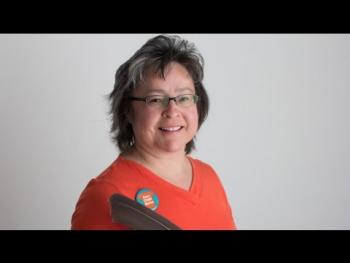Image Caption
Summary
Audio
Orange Shirt Day is Sept. 30 of each year. Phyllis Webstad, founder of Orange Shirt Day, spoke with Jeremy Harpe of Windspeaker Radio about the day’s origins.
It is meant to honour and remember residential school survivors and their families and to create conversations about all aspects of Indian residential schools in Canada. The day, Sept. 30, was chosen because it was a time when Indigenous children were taken away from their families and communities to be sent to Indian residential schools.
“I heard an Elder say that September was crying month,” said Webstad.
It was created as a result of the Truth and Reconciliation Commission coming to Williams Lake, B.C. in 2013, said Webstad. The TRC collected student survivor statements and other testimony to document the legacy of abuses that came from the Indian residential school system in Canada.
Chief Commissioner Murray Sinclair had challenged people in Williams Lake to keep the conversation going after the TRC had wrapped up its work. Orange Shirt Day is a result of that challenge.
Webstad remembered the day when she was taken to residential school. Her grandmother had purchased clothes for young Phyllis to wear, and Phyllis had chosen an orange shirt. Once at the school though, that orange shirt was taken away from her and she never saw it again.
The orange shirt is now representative of all those things lost to Indigenous peoples as a result of the Indian residential school system.—among them, culture, language and connection to community and family.
She said the Orange Shirt movement has been ‘divinely guided.’
”I’ve always been a person that needed to know everything (about) what’s going on. And I’ve come to terms with (the fact) that I will never know everything that’s going on with Orange Shirt Day or see every shirt or every event.” Though, Webstad does ‘Google’ the event from time to time to try to understand the growing reach of the activities.
Today, the Sept. 30 date allows teachers and students to get back to school after summer, and allows time for lessons about residential schools to happen and for schools to organize events around those lessons, said Webstad.
“The residential school legacy is not just First Nation history. It is Canadian history. And we need to teach children, so they understand. They have empathy. So it will be a different world.”

